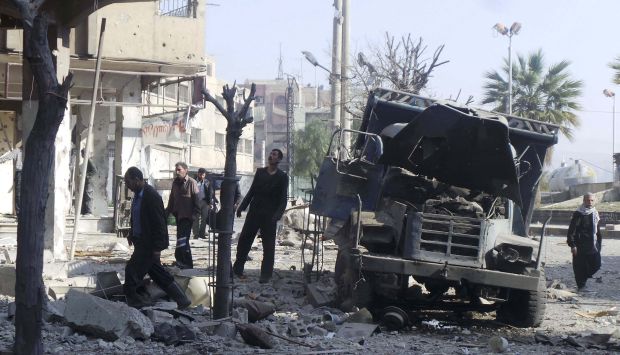
People stand near a damaged truck at a site hit by what activists said was an air strike by forces loyal to Syrian President Bashar Al-Assad in Duma, Damascus, on April 4, 2014. (Reuters/Badra Mamet)
London, Asharq Al-Awsat—As fighting between Syrian government and rebel forces continued in and around the capital, unconfirmed reports continued to emerge from Syria that the regime had used chemical weapons in the Damascus district of Jobar.
Government airstrikes killed at least seven people in Damascus on Friday as pro-Assad forces continued to try to solidify their grip on the capital, pushing out rebel forces that have secured territory in the Rif Dimashq government. Ismail Al-Darani, a rebel commander in the governorate, described the military operation as an “unprecedented escalation” in comments to Asharq Al-Awsat earlier this week.
His comments came a day after rebel fighters claimed that the Assad regime had used chemical weapons in an attack on rebels in the Damascus district of Jobar. Activists from the opposition “Jobar Revo” group posted a video on YouTube showing a man being treated after being caught in the alleged chemical attack. A voice off-screen said Thursday’s date and that the man in the video had been injured in a “poison [gas] attack in Jobar.”
Activists from another rebel group, the Syrian Revolutionary Coordinators’ Union, told Reuters that those injured in the reported attack were in good condition.
These still-unconfirmed reports follow a Syrian government letter to the UN a week ago warning that Syrian rebels were planning on carrying out a chemical weapons attack in Damascus with the objective of blaming this on the Assad regime. That letter specifically mentioned Jobar.
Also on Friday, the joint UN–Organization for the Prohibition of Chemical Weapons (OPCW) mission in Syria announced that the 12th batch of chemical weapons had been removed from the country. OPCW Director-General Ahmed Üzümcü said that Syria must follow this up with “further rapid movements” and “make up for lost time by increasing the volumes of chemicals to be removed.”
In news about forces present on the ground, members of the Syrian Social Nationalist Party (SSNP) are taking part in the fighting in Syria alongside the pro-Syrian government militia known as the National Defense Units, according to the head of the UK-based Syrian Observatory for Human Rights, Rami Abdul Rahman.
In comments to Asharq Al-Awsat, Abdul Rahman said: “The party’s participation in the raging battles in Syria aims to give a secular impression to the conflict, portraying it as if it was between two [ideological] projects: secular/nationalist, on the one hand and Islamist/extremist on the other.”
“The presence of the SSNP fighters is concentrated in Christian-majority areas,” Abdul Rahman said, claiming that they have fought in Ma’aloula in Rif Dimashq, Sadad, in the Homs countryside, and near Jaramana.
“Most of the SSNP fighters are untrained and lack military skills; this means that their presence does not add anything on the ground in favor of the regime, particularly given that their numbers do not exceed a few hundred.”
The SSNP is Syria’s second-largest political group, and one of its oldest. Its members advocate the establishment of a Greater Syria, extending from the Sinai Peninsula to some parts of Iran.
